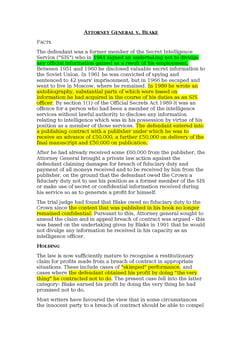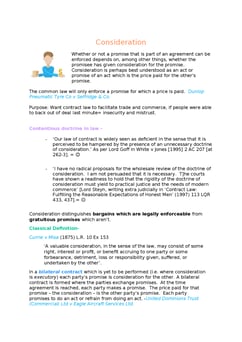Re Selectmove [1995] 2 All ER 531
Judgement for the case Re Selectmove
Table Of Contents
KEY POINTS
A commitment to pay a sum that a debtor was already legally obligated to pay does not constitute good consideration.
The idea that a commitment to perform an existing duty could amount to good consideration if it provided practical advantages is limited to circumstances where the obligation involved is in a provision of goods and services (Williams v Roffey Bros & Nicholls (Contractors) Ltd [1990] 1 All ER 512). It would be impossible to extend that approach to a payment obligation in accordance with the doctrine of precedent.
FACTS
The company, Selectmove Ltd. owed the Revenue significant amounts of tax and National Insurance Contributions (NIC).
In a meeting with the tax collector in July 1991, the company's managing director recommended paying the tax and NIC as they were due beginning in August 1991 and repaying the arrears at a rate of £1,000 per month beginning in February 1992, when the company becomes profitable again.
The tax collector explained that he would need to get approval from his superiors and that if it was rejected, he would revert to the company. The company did not hear back from the tax collector until October 1991.
In October, when the Revenue sought full payment of the arrears, and eventually presented the winding up petition, the company argued that the petition to wind up should be dismissed, based on the proposal accepted by Revenue, signified by their silence until October.
The judge, however, declared the company insolvent because there was no agreement between the Revenue and the company, and the Revenue's silence over the proposal did not amount to an agreement. Furthermore, consideration is an absolute requirement in every agreement.
According to the company, the tax collector had the authority to accept the proposal and there was an implication that Revenue had accepted it, by remaining silent. Also, by virtue of this agreement with the Revenue, the latter was estopped from collecting the debt owed by the company.
COMMENTARY
It was held that since the collector had no real or ostensible authority to agree to the company’s proposal, and the Revenue had made no representation to the company that to that effect, his silence did not indicate acceptance of the company’s proposal.
Even if an agreement had been reached between the company and the Revenue, it was unenforceable due to a lack of consideration. There are certain cases where there is a practical advantage to accepting a lower debt payment, however, even in such cases, the consideration is not enough to form a binding contract. The company attempted to apply the principle in Williams v Roffey Bros [1990], however, that failed because it was applicable only when the pre-promised existing obligation is to provide one with goods or services, not where the obligation is to pay money.
In this case, the doctrine of promissory estoppel does not apply. Because the collector lacked the real or ostensible authority to make the agreement with the company, he lacked the right to make the promise that is said to establish the estoppel against the Revenue.
ORIGINAL ANALYSIS
Defendant owed revenue, Plaintiff, tax and NIC and tried to offer the tax collector a proposal to stagger the owed payments.
He said he would have to check it with his superiors and tell the company if it was unacceptable. Defendant heard nothing more.
CA held that the silence of the tax collector, who did not himself have the authority to make such an agreement obviously meant there was no acceptance of the contract, while there was no consideration since delayed payment of a debt already owing is clearly not consideration.
Gibson LJ
Said that Beer was analogous and would have to be disregarded if the Williams doctrine was extended to cases of debt.
As for the argument that the Revenue had accepted the terms, this was wrong because the tax collector had no authority to make an acceptance, or even to bind his superiors to do so.
RELATED CASES
For Further Study on Re Selectmove

These are detailed case summaries (excerpts from cases - not paraphrase...

Contract law notes fully updated for recent exams at Oxford and Cambrid...
Need instant answers? Our AI exam tutor is here to help.
Ask questions 🙋 Get answers 📔 It's simple 👁️👄👁️
Our AI is educated by the highest scoring students across all subjects and schools. Join hundreds of your peers today.
Get StartedSimilar Cases
Related Product Samples
These product samples contain the same concepts we cover in this case.

 Since 2010, Oxbridge Notes has been a trusted education marketplace, supplying high-quality materials from top achievers at universities like Oxford, Cambridge, LSE, Harvard, and Yale.
Since 2010, Oxbridge Notes has been a trusted education marketplace, supplying high-quality materials from top achievers at universities like Oxford, Cambridge, LSE, Harvard, and Yale.